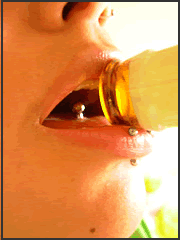 People who smoke the strongest form of cannabis – known as skunk – may be more at risk of psychosis than those who use milder forms, UK researchers claim.
People who smoke the strongest form of cannabis – known as skunk – may be more at risk of psychosis than those who use milder forms, UK researchers claim.
In a study of 300 people, those who had suffered an episode of psychosis were 18 times more likely to have smoked skunk than other cannabis users.
A Royal College of Psychiatrists meeting heard they were also more likely to use cannabis every day.
Link to BBC News Article
How children respond to the smell of alcoholic beverages is related to their mothers’ reasons for drinking, according to a new study from the Monell Chemical Senses Center. When asked to smell both the odor of beer and an unpleasant odor and then indicate which they liked better, children of mothers classified as ‘Escape drinkers were more likely than children of Non-escape drinkers to select the unpleasant odor over beer.
“Children’s responses to odors provide us with a window into their emotions, says study lead author Julie Mennella, PhD, a Monell biopsychologist. “When given a choice between beer and pyridine – the smell of rotten eggs – children of mothers who drink to relieve tension and worry choose pyridine as smelling better. That’s pretty powerful.
In the study, which appears in the journal Alcohol, 145 children between the ages of 5 and 8 years were presented with seven pairs of odors. One of the odors was always beer; the others were bubblegum, chocolate, cola, coffee, green tea, pyridine, and cigarette smoke. For each pair, the children indicated which odor they liked better. [continue reading…]
 The rise in binge drinking in the young is a “fashion phenomenon” where drinkers are copying their associates’ behaviour, new research has shown.
The rise in binge drinking in the young is a “fashion phenomenon” where drinkers are copying their associates’ behaviour, new research has shown.
A study conducted at Durham University’s Institute of Advanced Study and Volterra Consulting UK shows that social networking is a key factor in the spread of the rapid consumption of large amounts of alcohol – binge drinking – which is blamed for serious anti-social and criminal behaviour.
Researchers say the findings have major implications for Government policy makers charged with tackling the problem, which has longer-term and costly health implications for the nation. [continue reading…]
 Researchers at The University of Texas Medical School at Houston are studying a number of medications that may help restore the fragile balance of chemicals or neurotransmitters in the brain destroyed by cocaine abuse, making recovery more possible.
Researchers at The University of Texas Medical School at Houston are studying a number of medications that may help restore the fragile balance of chemicals or neurotransmitters in the brain destroyed by cocaine abuse, making recovery more possible.
“With chronic cocaine use, there are changes in the brain that affect neurotransmitters that are responsible for impulsivity and decision making,” said F. Gerard Moeller, Ph.D., professor in the Department of Psychiatry and Behavioral Sciences at the medical school. “If we can restore the balance of the neurotransmitters back to the way it was before the cocaine, then other therapies such as behavioral therapy will work better.” [continue reading…]
 People who smoke the strongest form of cannabis – known as skunk – may be more at risk of psychosis than those who use milder forms, UK researchers claim.
People who smoke the strongest form of cannabis – known as skunk – may be more at risk of psychosis than those who use milder forms, UK researchers claim.

